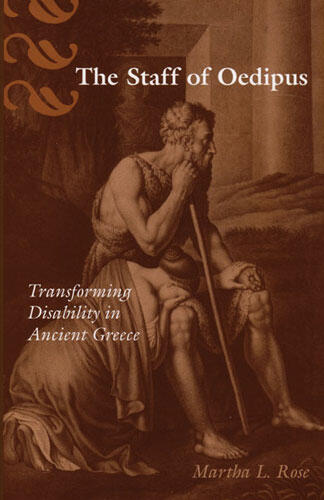The Staff of Oedipus
Transforming Disability in Ancient Greece
Exposes centuries-old disability myths that still survive today
Description
Ancient Greek images of disability permeate the Western consciousness: Homer, Teiresias, and Oedipus immediately come to mind. But The Staff of Oedipus looks at disability in the ancient world through the lens of disability studies, and reveals that our interpretations of disability in the ancient world are often skewed. These false assumptions in turn lend weight to modern-day discriminatory attitudes toward disability.
Martha L. Rose considers a range of disabilities and the narratives surrounding them. She examines not only ancient literature, but also papyrus, skeletal material, inscriptions, sculpture, and painting, and draws upon modern work, including autobiographies of people with disabilities, medical research, and theoretical work in disability studies. Her study uncovers the realities of daily life for people with disabilities in ancient Greece and challenges the translation of the term adunatos (unable) as "disabled," with all its modern associations.
Martha L. Rose is Professor of History, Truman State University.
Reviews
"A break-through book, The Staff of Oedipus exposes regnant myths about disability that have been passed along as if true for hundreds of years."
- Lennard Davis, University of Illinois, Chicago
—Lennard Davis, University of Illinois, Chicago
". . . an intriguing account of the way the Greeks viewed handicap. . . . All in all, the book is a fascinating and clearly argued account of an unusual aspect of life in the ancient world."
- Myfanwy Giddings, Kendrick School, Reading
—Journal of Classics Teaching
". . . a valuable contribution to the study of ancient Greece, in that it makes the reader apprehend Greek history from the point of view of a disabled/non-disabled perspective."
- D. P. M. Weerakkody, Univ of Peradeniya, Sri Lanka
—Scholia Reviews
"Martha Rose presents a well-researched study of physical disability in ancient Greece. Not only does the book further our awareness of issues related to the body and its care, but it also helps to dispel misunderstood perceptions of disability in the past."
- Patricia A. Baker, University of Kent
—Medical History

